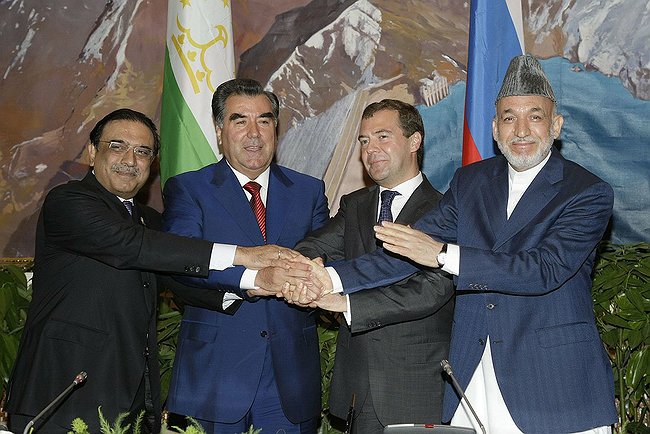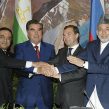
Russia’s Quiet Rapprochement with Pakistan
Publication: Eurasia Daily Monitor Volume: 9 Issue: 107
By:

Quietly and unobtrusively, a Russo-Pakistani rapprochement has been developing behind the scenes of world politics for the last two years. On Pakistan’s side, the almost spectacular deterioration of relations with the United States and NATO has led it to seek new friends, especially as the North Atlantic Alliance accelerates its withdrawal from Afghanistan. Russia also fully understands that Pakistan is a crucial player in Afghanistan and that, as NATO withdraws, it becomes all the more urgent for Moscow to seek some sort of modus vivendi with Islamabad. Thus Russia initiated four-party talks with Tajikistan, Pakistan and Afghanistan to discuss the latter’s future. Furthermore, Pakistani President Asif Ali Zardari met six times with Russian President Dmitry Medvedev between 2008 to 2012, and President Vladimir Putin is set to visit the South Asian country in September.
This modest, albeit real rapprochement is, however, built upon a long-standing foundation of mistrust. Russian officials have long been concerned over the safety and security of Pakistan’s nuclear weapons arsenal (Geo Television Network, March 25, 2009). Due to those concerns and Pakistan’s record, foreign policy analysts like Alexei Arbatov observed that for Russia, Pakistan is a principal potential threat to non-proliferation. Other observers, like the former director of Russia’s Foreign Intelligence Service and Ambassador to India, Vyacheslav Trubnikov, view Pakistan, Iran and North Korea, as destabilizing nuclear powers (https://pakistankakhudahafiz.wordpress.com/2009/04/11/pakistan-principle-nuclear-threat-russia/; Strategic Culture Foundation, May 4, as reported in indrus.in, May 5). Therefore, Russia wants Pakistan to join the Nuclear Non-Proliferation Treaty (NPT) (The Voice of Russia, February 9).
But while this residual Russian suspicion remains, other factors have impelled Moscow to seek a rapprochement with Islamabad. The deteriorating Afghan situation, the realization that it must deal with Pakistan on its own merits – apart from the Indo-Pakistani connection – to help secure Afghanistan and Central Asia, and the opportunities provided by the erosion of the US-Pakistan alliance are too important for Moscow to avoid. Thus, Russia has now determined to deal with Pakistan independently and acknowledged that relations will be on a bilateral presidential level – as they are with India (The Hindu, September 9, 2010).
Moscow has been alert to these possibilities for some time. Already, in 2009, Russian state television accused the US of trying to destabilize Pakistan to damage China, Pakistan’s “all-weather” ally and friend (Rossiya TV, May 13, 2009). Since then, Moscow has also announced its support for Pakistan’s efforts to join the Shanghai Cooperation Organization (SCO) (Russia Today, May 13, 2011). While this latter move may be regarded as a concession to Beijing who has long-supported Pakistan’s entrance into the SCO, there is no sign that China is ready to welcome India, whom Moscow has supported, into the SCO. But there is no doubt that Pakistan’s membership in the SCO would strengthen the SCO’s claim and perhaps its capacity to involve itself in a post-ISAF Afghanistan.
There are tempting energy and economic objectives as well that could lead to advantageous geopolitical outcomes between the two countries. Gazprom has regularly hinted at its interest in investing in or helping to build the proposed but troubled Turkmenistan-Afghanistan-Pakistan-India (TAPI) gas pipeline (RIA Novosti, October 22, 2010; Reuters, March 8). Since that pipeline has been a potential showcase for US policy, Russian participation would not only enhance Moscow’s ties and influence with all the players, it would also undermine US credibility and policy in Central Asia. Beyond the TAPI pipeline, Moscow clearly also has interests in expanding its energy profile throughout South Asia, for example in assisting Sri Lanka’s oil exploration projects (Lankadeepa [Colombo] June 20, 2011).
As expected, the new rapprochement is also founded on trade. Russian exports to Pakistan rose from $93 million in 2002 to $620 million in 2008, and both sides feel there is room for further growth (Interfax, November 7, 2011). Then-Prime Minister Putin said in 2011 that Russia views Pakistan as a reliable and very important partner. Putin’s remarks were indicative of how far Russian-Pakistani relations progressed, despite Moscow’s long-held suspicions of Islamabad’s aims (Interfax, November 7, 2011). Yet, perhaps the most striking aspect of this rapprochement is that it now may also encompass security cooperation. Discussions are already underway about expanding defense ties by holding joint military exercises, exchanging trainees and trainers, and selling Russian weapons to Pakistan. It remains to be seen if such cooperation will truly materialize and expand. But if it does, the reactions of India and China to these events will merit close scrutiny.
To be sure, Moscow-Islamabad relations are not exclusively positive. Pakistan’s support for terrorist groups, its fast-growing nuclear program, as well as its past history of international nuclear proliferation are surely not forgotten. But, as the Central and South Asian configuration of states now undergoes a new transformation, Russia needs to reach out to Pakistan and has the opportunity to exploit Washington’s difficult relations with Islamabad. Therefore Putin’s upcoming visit to Pakistan in September will be, for many reasons, a visit worth watching.




